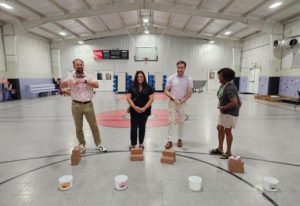Reasonable Doubt: Musical mystery tour
Published 12:00 am Sunday, April 13, 2008
What’s the last song you heard on the radio? Do you recall?
On some level, you probably do; even if you don’t recall the words – or couldn’t tell what they were – you may retain an emotional impression.
Trending
Music does that. It’s a mysterious thing, as we’ve known for centuries.
“It is not easy to determine the nature of music, or why anyone should have a knowledge of it,” Aristotle wrote in Book VIII of his “Politics.” But he speculated that it could be considered educational, amusing and a source of intellectual enjoyment. Some types produce good effects, while others “enfeeble the mind,” he said.
That’s pretty much what people have held to be true about music ever since – generally believing that whatever genre they personally like is good, while other peoples’ favorites are enfeebling.
If we recognize music’s influence, though, why don’t we pay closer attention to what we’re putting in our heads?
Except for the rare live performance that rivets our attention, most of us tend to listen to music as background, not really noticing what it’s telling us.
I got curious. I decided to spin the dial through a few local FM stations and pay attention to what the songs were actually saying. Was I being surreptitiously enfeebled?
Trending
I started with Western Kentucky University’s student-run station, Revolution 91.7, WWHR. It’s one I listen to a lot, but plays sufficient variety of recent music that you never know what you’re going to hear. I heard something familiar, but I’m still not sure what it means. It was “Song 2” by Blur. The lyrics start with “I got my head checked/By a jumbo jet,” and don’t get any clearer from there. So far as I can tell, it’s an ode to being confused.
Altogether, I think, it would be pretty hard to be offended, damaged or inspired.
I retreated from modernity to classic rock, at 93.3 WDNS. I think a lot of the appeal of “classic rock” is nostalgic, reminding its listeners of high school, or the times we should’ve been there to see. And frankly, that’s what I got from the next song on the playlist: Pink Floyd’s “Wish You Were Here.”
Not that the Good Old Days seem to have all been good. The song is filled with sardonic questions about perception: “Can you tell a green field from a cold steel rail?/A smile from a veil?/Do you think you can tell?”
Overall, it expresses a longing for companionship amid banality and pointlessness – “We’re just two lost souls swimming in a fish bowl, year after year/Running over the same old ground/What have you found? The same old fears.”
Whether old or new, rock music is generally about asking questions of the established order, seeking a change or denouncing the status quo. Its polar opposite, perhaps, is country music. That, it’s always seemed to me, is frequently about not asking questions. Many country songs are about struggling through bad times, enduring whatever life throws with the automatic acceptance that that’s how life is.
I’m not a country fan, but I remember reading Molly Ivins’ words that listening to country is essential for understanding the political and social attitudes of most Americans.
So I tuned in the Beaver, 96.7, where Johnny Van Zant told me that “Nobody’s Gonna Tell Me What To Do.”
Mr. Van Zant, it seems, was dissatisfied indeed. He quit his job at the coal mine shortly after his father died disappointed at the same job, and set off for parts and future unknown.
“Spent most of my life wrapped up tight in somebody else’s hand-me-down-old shoes/Starting today I’m someone I’d be proud to know/You might tell me where to go/But there ain’t nobody going to tell me what to do.”
Rebellious as that sounds, he didn’t start a strike at the mine, and shrugs off what’ll happen to him next. It’s angry, but ultimately accepting of whatever happens.
Aristotle advised teaching the basics of music so people could understand and appreciate professional performers. I think the basic intent of what’s on the radio today – except maybe for “Song 2” – is clear enough to anyone who pays attention, without special education. The question is simply whether we’re actually noticing what it’s saying.
And that’s important, as was even known to a guy whose favorite musicians played the lyre and Aeolian flute.
“Rhythm and melody supply imitations of anger and gentleness, and also of courage and temperance, and of all the qualities contrary to these … in listening to such strains our souls undergo a change,” Aristotle said. “The habit of feeling pleasure or pain at mere representations is not far removed from the same feeling about realities.”







